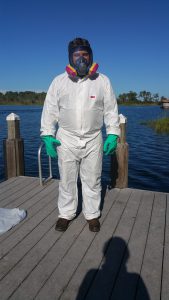 For many of us keeping a work life balance is a challenge. How many of you find yourself bringing work “home with you”? It is bad enough to not be able to turn the work phone off, or turn our brains away from work, but what else is coming home with you? If you work with pesticides, its really important to leave work at work, so follow Pesticide Hygiene, striking the work/home balance.
For many of us keeping a work life balance is a challenge. How many of you find yourself bringing work “home with you”? It is bad enough to not be able to turn the work phone off, or turn our brains away from work, but what else is coming home with you? If you work with pesticides, its really important to leave work at work, so follow Pesticide Hygiene, striking the work/home balance.
One of the first lines of defense against pesticide covering you is to “READ THE LABEL”. Our returning readers will know we cover this in great detail, because it is SO important. The label will tell you how to use the product in a way that minimizes exposure and will give you another important detail PPE. Personal Protective Equipment is the clothing or other materials you wear to protect you from exposure. Things like gloves, goggles, long sleeve shirts, they all help. We have said it before and we will say it again, so you better be down with PPE, yeah you know me!
All that PPE is great, but if it is protecting YOU from exposure, there is a good chance it is exposed to pesticides. This means without cleaning, or proper care, the very thing protecting you could harm you. Always carefully remove PPE and keep it clean. Sometimes your PPE is the very clothing you are wearing. Leave work at work! Change out of your work clothes and maybe shower if possible BEFORE you head home. Store those work clothes in a separate bag or plastic bin meant ONLY for work clothes.
Traveling Home
In an ideal world we could all do that, but the reality is you may not be able to change at work. Worse still, you might get in your personal car to drive home. Now your car/truck is possibly contaminated with pesticides. Not good! One way to avoid this contamination with both work and personal trucks is to use seat liners. You can even use something as simple as old bed sheets to line the seat. These can be removed once you are in clean clothes and either washed if they are reusable, or properly disposed of if disposable.
Alright you have followed our advice so far, you have come home clean, not covered in pesticides. Now what to do with your work clothes, those aren’t disposable are they? Well very heavily soiled clothes maybe should be thrown out. If you dumped concentrated pesticide all over your clothes, it might be time to update your wardrobe. For those clothes that are not heavily soiled you can wash them at home…but like all things work keep it separated. Wash all work clothes separate from the rest of the laundry. Wash it on hot, with agitation, 2 rinse cycles on spin if you can. After you are done, run at least one empty cycle before doing non-work laundry. If you think about it this is just like a triple rinse! Line dry clothes where possible, otherwise on the hottest setting the clothes will handle.
There you have it, part of your pesticide safety regime really is keeping work and home separate. Follow the label, keep yourself and clothes clean at work. If possible, change before going home, or keep seat liners in the car. Wash your clothes separately and you are ready. Now enough about work and pesticide hygiene, striking the work/home balance. Put your feet up and relax at home and be happy!
Click To Subscribe
Source: UF/IFAS Pest Alert
Note: All images and contents are the property of UF/IFAS.



